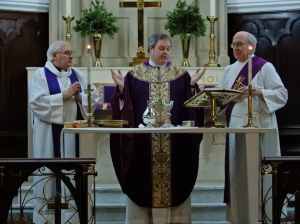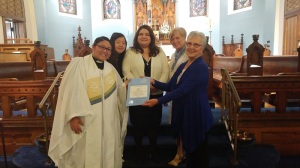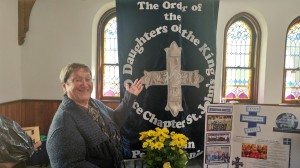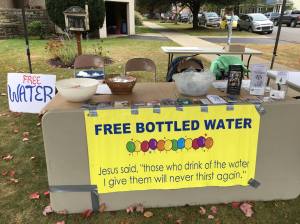Have you ever had a time when a book quote or song lyric came into your life at just the right moment to teach you something invaluable? I recently read The Gifts of Imperfection by Brené Brown, the author/research professor whose work on vulnerability we explored at the last diocesan convention, and there were several times when I stopped mid-paragraph to take notes. “THIS! This is ABSOLUTELY true for me!” may have popped out of my mouth more than once. (Aside: If you have a chance to pick up ANY of Dr. Brown’s books, it’s well worth your time. If you’re short on time, though, Youtube has several clips of her talks as well that are worth exploring.)
There are several sections throughout the book that I’m adding to my “personality traits to work on” list, but one quote in particular caught my eye in relation to an interview I had with Robin Murray of St. John’s, Franklin:
“One of the greatest barriers to connection is the cultural importance we place on “going it alone.” Somehow we’ve come to equate success with not needing anyone. Many of us are willing to extend a helping hand, but we’re very reluctant to reach out for help when we need it ourselves. It’s as if we’ve divided the world into “those who offer help” and “those who need help.” The truth is that we are both.” ― Brené Brown, The Gifts of Imperfection: Let Go of Who You Think You’re Supposed to Be and Embrace Who You Are
It particularly struck a chord because Robin and I were discussing Stephen Ministry – a one to one lay caring ministry that is based on creating connections between people who are currently hurting and those who have experienced similar situations.
 From the official Stephen Ministries website: “Stephen Ministry is the one-to-one lay caring ministry that takes place in congregations that use the Stephen Series system. Stephen Ministry congregations equip and empower lay caregivers—called Stephen Ministers—to provide high-quality, confidential, Christ-centered care to people who are hurting.” Stephen Ministers are not counselors, but they are laypeople trained to be caring, non-judgmental, confidential listeners for those in need due to job loss, divorce, grief, chronic illness, or just going through a difficult time.
From the official Stephen Ministries website: “Stephen Ministry is the one-to-one lay caring ministry that takes place in congregations that use the Stephen Series system. Stephen Ministry congregations equip and empower lay caregivers—called Stephen Ministers—to provide high-quality, confidential, Christ-centered care to people who are hurting.” Stephen Ministers are not counselors, but they are laypeople trained to be caring, non-judgmental, confidential listeners for those in need due to job loss, divorce, grief, chronic illness, or just going through a difficult time.
The program began in 1975 when Lutheran pastor Dr. Kenneth Haugk trained nine members of his congregation to assist with pastoral care as ‘lay listeners’. Stephen Ministry has since expanded to include over 12,000 Christian congregations around the U.S. and abroad, including the Stephen Ministry program at St. John’s, Franklin.
The group at St. John’s began their journey in 2012. The Rev. Holly Davis had initially mentioned the ministry to Robin Murray, who already had a leaning toward pastoral care (“I was convinced I was going to be a deacon!”), and told her that it was about matching people up that have similar problems. Robin’s response? “Well, I can do that!” Robin then looked into attending a free seminar about the ministry in Butler with the Rev. Ed Lowrey, Mother Holly and Linda Trikur from St. John’s, and, after Mother Holly spoke to Bishop Sean about the program, they applied for leader training in Pittsburgh. Within three months enough people in the congregation had shown interest that they began training their first group of Stephen Ministers – twice a week meetings for the next four months.
While Stephen Ministers are well trained to be lay listeners and caregivers, the thing that really strikes me about the ministry is connection. People who might normally try to “go it alone” are put in touch with people who have been in a similar place, so they can share their feelings openly and be understood on a deeper level than with someone who hasn’t experienced similar hurts. To paraphrase Brené from the quote above, we can both need help and offer help, and this ministry encompasses both sides. I come from a family where it’s strongly encouraged NOT to talk about problems. Over time that approach becomes very isolating, and you assume that no one else has gone through what you have – you’re alone. Stephen Ministry, by pairing you with someone who’s already ‘been there, done that’, gives a feeling of deep connection to those who may well feel like they’re alone in their pain.
Care receivers (those who need help) have different avenues available to get in touch with a Stephen Minister. They can contact the church directly, or they may be referred by a friend, family  member, or a service professional. Robin has said that the Visiting Nurses Association has occasionally contacted the Stephen Ministry group on behalf of a client who has expressed interest in the program. After the initial contact is made with the church or one of the Stephen Leaders, a representative meets with the person and explains what Stephen Ministry is and is not (a caring ear, not a maid/personal shopper/etc). They are then matched with a Stephen Minister within a few days. Meetings are usually once a week for about an hour, either in person or on the phone (though Robin says in one instance they have a care receiver who likes to stay in contact via email with their Stephen Minister when the person is away over the winter months). People are paired women to women, men to men, with similar problems if at all possible, and care receivers must be over age 21 to be put in touch with a St. John’s Stephen minister.
member, or a service professional. Robin has said that the Visiting Nurses Association has occasionally contacted the Stephen Ministry group on behalf of a client who has expressed interest in the program. After the initial contact is made with the church or one of the Stephen Leaders, a representative meets with the person and explains what Stephen Ministry is and is not (a caring ear, not a maid/personal shopper/etc). They are then matched with a Stephen Minister within a few days. Meetings are usually once a week for about an hour, either in person or on the phone (though Robin says in one instance they have a care receiver who likes to stay in contact via email with their Stephen Minister when the person is away over the winter months). People are paired women to women, men to men, with similar problems if at all possible, and care receivers must be over age 21 to be put in touch with a St. John’s Stephen minister.
One example of how this works involves Robin’s best friend, who lost her son when he was 21 – just a few months before Robin went through Stephen Ministry training. Initially the woman refused to speak to anyone about what had happened, but during a later visit Robin asked if her friend would be interested in speaking with a Stephen Minister. Her friend agreed, and Robin placed a call on a Tuesday to locate a Stephen Minister. Within two days someone was in touch with her friend, and for the first time since her son’s death she was able to discuss the issue.
While St. John’s is currently the only congregation in the diocese with trained Stephen Ministers, Robin would like everyone to know that if there is someone in need outside the greater Franklin area, the St. John’s group can put them in touch with other, closer churches who also have a Stephen Ministry program. They network regularly with groups in Clarion, Grove City, and Meadville, and there are several non-Episcopal congregations in the Erie area that have Stephen Ministers available as well.
If Stephen Ministry is of interest to you or your church, either as a point of connection for people in need or for discerning whether a Stephen Ministry program has a place in your community, you are welcome to contact Robin Murray (ralfiny@zoominternet.net).
We don’t have to do all of it alone. We were never meant to.
— Brené Brown, Rising Strong: The Reckoning. The Rumble. The Revolution
Megin Sewak is Assistant for Communications for the Diocese of NWPA.
 It’s a great day in the Kingdom, and especially in the Diocese of NWPA! Bishop Sean will ordain Nicholas Evancho to the priesthood on Saturday, June 2, at 2:00 PM at the Church of the Epiphany in Grove City, PA. All are welcome to attend.
It’s a great day in the Kingdom, and especially in the Diocese of NWPA! Bishop Sean will ordain Nicholas Evancho to the priesthood on Saturday, June 2, at 2:00 PM at the Church of the Epiphany in Grove City, PA. All are welcome to attend.










